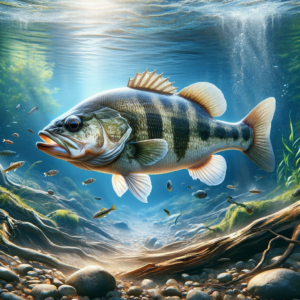Have you ever wondered why smallmouth bass is often overlooked when it comes to eating fish? While larger and more popular species like salmon and tuna tend to steal the limelight, smallmouth bass deserves a closer look. In this article, we will explore the reasons why smallmouth bass shouldn’t be underestimated when it comes to its culinary potential.
Smallmouth bass may not be as famous as other fish species, but it offers a delightful flavor and a firm texture that can rival many popular seafood options. Its meat has a mildly sweet taste with a hint of earthiness, making it a versatile ingredient in various dishes. Whether you prefer grilling, baking, or pan-frying, smallmouth bass can hold up well to different cooking methods, providing a satisfying dining experience.
Despite its culinary merits, smallmouth bass is often overshadowed due to various reasons. One of the main factors is its availability. Smallmouth bass is primarily found in freshwater bodies like rivers and lakes, making it less accessible compared to marine species. Additionally, the perceptions surrounding freshwater fish, such as a muddy taste or concerns about water pollution, have contributed to its underappreciation.
In the upcoming article, we will delve deeper into the nutritional benefits of smallmouth bass, explore different cooking techniques, and debunk common misconceptions about its taste. You’ll discover that incorporating smallmouth bass into your diet can be a delectable and healthy choice. So, get ready to embrace the flavors of smallmouth bass and give this underrated fish the recognition it deserves.
Why Smallmouth Bass Shouldn’t Be Overlooked When it Comes to Eating Fish
Introduction to Smallmouth Bass
When it comes to eating fish, many people have a tendency to focus on popular choices such as salmon, tuna, or halibut. However, there is a fish that often gets overlooked, and that is the smallmouth bass. Smallmouth bass is a freshwater fish that offers an array of nutritional benefits and a unique flavor profile. In this article, we will explore why smallmouth bass shouldn’t be ignored when it comes to incorporating fish into your diet.
Nutritional Value of Smallmouth Bass
Smallmouth bass is an excellent source of essential nutrients that are vital for overall health and well-being. One serving of smallmouth bass, which is approximately 3 ounces, contains about 130 calories, making it a relatively low-calorie protein option. It is also packed with high-quality protein, with each serving providing around 22 grams. Protein is essential for the growth and repair of body tissues, as well as for maintaining healthy hair, skin, and nails.
Furthermore, smallmouth bass is a rich source of omega-3 fatty acids, particularly eicosapentaenoic acid (EPA) and docosahexaenoic acid (DHA). These omega-3 fatty acids have been linked to numerous health benefits, including reduced inflammation, improved heart health, and enhanced brain function. Incorporating smallmouth bass into your diet can be an effective way to ensure you’re consuming an adequate amount of omega-3 fatty acids.
Health Benefits of Consuming Smallmouth Bass
Consuming smallmouth bass offers an array of health benefits due to its nutrient profile. The omega-3 fatty acids found in smallmouth bass have been shown to reduce the risk of cardiovascular diseases, such as heart attacks and strokes. These fatty acids help to lower blood pressure, reduce inflammation, and improve overall heart health.
Additionally, smallmouth bass is an excellent source of vitamins and minerals necessary for optimal health. It contains essential nutrients like vitamin D, which is crucial for bone health and immune function. It also provides minerals such as selenium, magnesium, and potassium, which play vital roles in supporting various bodily functions, including muscle contractions, nerve function, and maintaining electrolyte balance.
Preparing Smallmouth Bass for Cooking
Before cooking smallmouth bass, it is crucial to properly clean and fillet the fish. Start by rinsing the fish under cold water to remove any dirt or debris. Next, use a sharp knife to carefully remove the scales, starting from the tail and working your way towards the head. Once scaled, make a shallow cut behind the gills and insert the knife along the backbone to fillet the fish. Remove the fillet by making a clean cut along the rib cage, ensuring no bones remain.
Delicious Recipes for Smallmouth Bass
Smallmouth bass can be prepared in various ways to suit different tastes and preferences. Here are a few delicious recipes to try:
Grilled Smallmouth Bass with Lemon and Herbs:
- Marinate smallmouth bass fillets in a mixture of lemon juice, olive oil, garlic, and your favorite herbs.
- Grill the fillets for about 5-6 minutes on each side, or until cooked through.
- Serve with a squeeze of fresh lemon juice and garnish with additional herbs.
Baked Smallmouth Bass with Roasted Vegetables:
- Place smallmouth bass fillets on a baking tray lined with parchment paper.
- Season with salt, pepper, and your choice of herbs or spices.
- Surround the fillets with a mix of chopped vegetables, such as bell peppers, zucchini, and cherry tomatoes.
- Drizzle with olive oil and bake at 400°F (200°C) for approximately 15-20 minutes, or until the fish is cooked and the vegetables are tender.
Comparing Smallmouth Bass to Other Popular Fish
Smallmouth bass offers a unique flavor profile that sets it apart from other popular fish. Its taste is often described as mild and slightly sweet, with a firm texture. While salmon and tuna are commonly chosen for their distinct flavors, smallmouth bass provides a lighter and more delicate taste that can be enjoyed by those who prefer a milder fish.
From a nutritional standpoint, smallmouth bass holds its own against other popular fish choices. It provides a similar amount of protein as salmon, while also delivering essential omega-3 fatty acids. Additionally, smallmouth bass is lower in calories than some other fatty fish, making it a favorable option for those watching their caloric intake.
Eco-Friendly Fishing Practices for Smallmouth Bass
When it comes to consuming fish, sustainability is a crucial factor to consider. By practicing responsible fishing methods, we can help preserve the smallmouth bass population and ensure it remains a viable food source for years to come. Some eco-friendly fishing practices you can follow include:
Catch and Release: If you enjoy fishing for smallmouth bass, consider practicing catch and release. This way, you can still enjoy the thrill of catching the fish while allowing it to be released back into the water unharmed.
Respect Fishing Regulations: Familiarize yourself with local fishing regulations and adhere to them. These regulations are in place to protect fish populations and maintain a sustainable ecosystem.
Use Biodegradable Fishing Gear: Opt for biodegradable fishing gear, such as fishing lines and lures, to minimize the negative impact on the environment.
The Cultural Significance of Smallmouth Bass
Smallmouth bass holds a significant cultural significance in various regions where the fish is native. For example, in North America, smallmouth bass fishing is a popular recreational activity and is often associated with leisure and relaxation. It has become a part of the cultural fabric, with fishing tournaments, fishing clubs, and even festivals dedicated to celebrating this majestic fish.
Smallmouth Bass as a Sustainable Food Source
In recent years, there has been a growing interest in sustainable food sources. Smallmouth bass offers a fantastic opportunity to diversify our protein choices while supporting sustainable fishing practices. As a freshwater fish, smallmouth bass can be farmed in controlled environments, reducing the impact on wild fish populations. By incorporating smallmouth bass into our diets, we can promote sustainable food sources and reduce the strain on overexploited marine resources.
Conclusion: Embracing Smallmouth Bass in our Diets
When it comes to eating fish, smallmouth bass shouldn’t be overlooked. It offers a plethora of health benefits, ranging from being a rich source of protein and omega-3 fatty acids to providing essential vitamins and minerals. Smallmouth bass can be prepared in numerous delicious ways, and its unique flavor profile makes it a favorable choice for individuals who prefer a milder fish taste.
Moreover, consuming smallmouth bass supports sustainable fishing practices and reduces the reliance on overexploited marine resources. By embracing smallmouth bass in our diets, we not only expand our culinary horizons but also contribute to a more sustainable and diverse food system. So next time you’re considering incorporating fish into your meals, give smallmouth bass a chance and experience the joys it has to offer.




